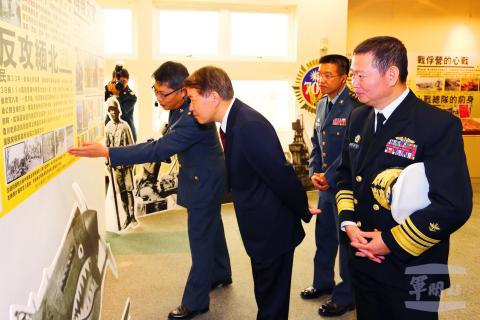US President Barack Obama on Friday signed into law the US National Defense Authorization Act for Fiscal Year 2017, which for the first time included a section on senior military exchanges with Taiwan.
The bill cleared the US Senate in a 92-7 vote on Dec. 8 after its approval in the US House of Representatives by a vote of 375-34 six days earlier.
Section 1284 of the act states: “It is the sense of [US] Congress that the [US] Secretary of Defense should conduct a program of senior military exchanges between the United States and Taiwan that have the objective of improving military-to-military relations and defense cooperation between the United States and Taiwan.”

Screengrab from the Military News Agency Web site
A “sense of Congress” is not legally binding, even though the language is included in an otherwise legally effective legislation.
It reflects the view of many on Capitol Hill who think the current level of US military exchanges with Taiwan has been insufficient.
It remains to be seen whether or how the administration of US president-elect Donald Trump will act on this section of the act.
Trump takes office on Jan. 20.
If implemented, the act stipulates that the senior military exchange program should be conducted at least once each calendar year in both Taiwan and the US.
It defines “senior military exchange” as “an activity, exercise, professional education event, or observation opportunity in which senior military officers and senior defense officials participate.”
It also defined “senior military officer” as a general or flag officer on active duty in the armed forces, while “senior defense official,” in reference to the US Department of Defense, was defined as a civilian official at the level of assistant secretary of defense or above.
The act will elevate Taiwan-US military ties to another level if institutionalized, National Chung Hsing University Institute of International Politics professor Tsai Ming-yan (蔡明彥) said yesterday.
The law is not only symbolic, but will have some practical effects, he said, adding that Taiwan and the US would have deeper cooperation on threat assessments and battle plans.
China might become agitated over the closer Taiwan-US ties, but continued threat of armed conflict against Taiwan would only deepen Taiwan’s resolve to work with the US and Japan, Tsai said, adding that China should seek to enter into dialogue with Taiwan.
The Ministry of National Defense said it has made a number of plans for next year, including Political Warfare Bureau Director Wen Chen-kuo (聞振國) leading a delegation to visit the Pentagon, at which time the two sides would discuss strategic goals and cooperation on matters of psychological warfare.

AGING: As of last month, people aged 65 or older accounted for 20.06 percent of the total population and the number of couples who got married fell by 18,685 from 2024 Taiwan has surpassed South Korea as the country least willing to have children, with an annual crude birthrate of 4.62 per 1,000 people, Ministry of the Interior data showed yesterday. The nation was previously ranked the second-lowest country in terms of total fertility rate, or the average number of children a woman has in her lifetime. However, South Korea’s fertility rate began to recover from 2023, with total fertility rate rising from 0.72 and estimated to reach 0.82 to 0.85 by last year, and the crude birthrate projected at 6.7 per 1,000 people. Japan’s crude birthrate was projected to fall below six,

US President Donald Trump in an interview with the New York Times published on Thursday said that “it’s up to” Chinese President Xi Jinping (習近平) what China does on Taiwan, but that he would be “very unhappy” with a change in the “status quo.” “He [Xi] considers it to be a part of China, and that’s up to him what he’s going to be doing, but I’ve expressed to him that I would be very unhappy if he did that, and I don’t think he’ll do that. I hope he doesn’t do that,” Trump said. Trump made the comments in the context

SELF-DEFENSE: Tokyo has accelerated its spending goal and its defense minister said the nation needs to discuss whether it should develop nuclear-powered submarines China is ramping up objections to what it sees as Japan’s desire to acquire nuclear weapons, despite Tokyo’s longstanding renunciation of such arms, deepening another fissure in the two neighbors’ increasingly tense ties. In what appears to be a concerted effort, China’s foreign and defense ministries issued statements on Thursday condemning alleged remilitarism efforts by Tokyo. The remarks came as two of the country’s top think tanks jointly issued a 29-page report framing actions by “right-wing forces” in Japan as posing a “serious threat” to world peace. While that report did not define “right-wing forces,” the Chinese Ministry of Foreign Affairs was

PREPAREDNESS: Given the difficulty of importing ammunition during wartime, the Ministry of National Defense said it would prioritize ‘coproduction’ partnerships A newly formed unit of the Marine Corps tasked with land-based security operations has recently replaced its aging, domestically produced rifles with more advanced, US-made M4A1 rifles, a source said yesterday. The unnamed source familiar with the matter said the First Security Battalion of the Marine Corps’ Air Defense and Base Guard Group has replaced its older T65K2 rifles, which have been in service since the late 1980s, with the newly received M4A1s. The source did not say exactly when the upgrade took place or how many M4A1s were issued to the battalion. The confirmation came after Chinese-language media reported